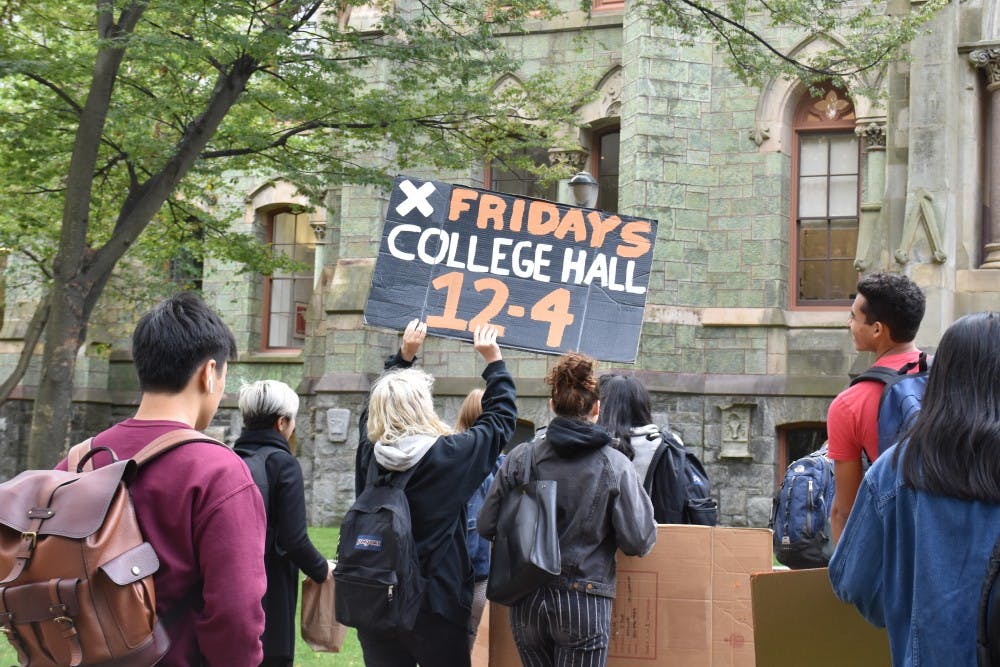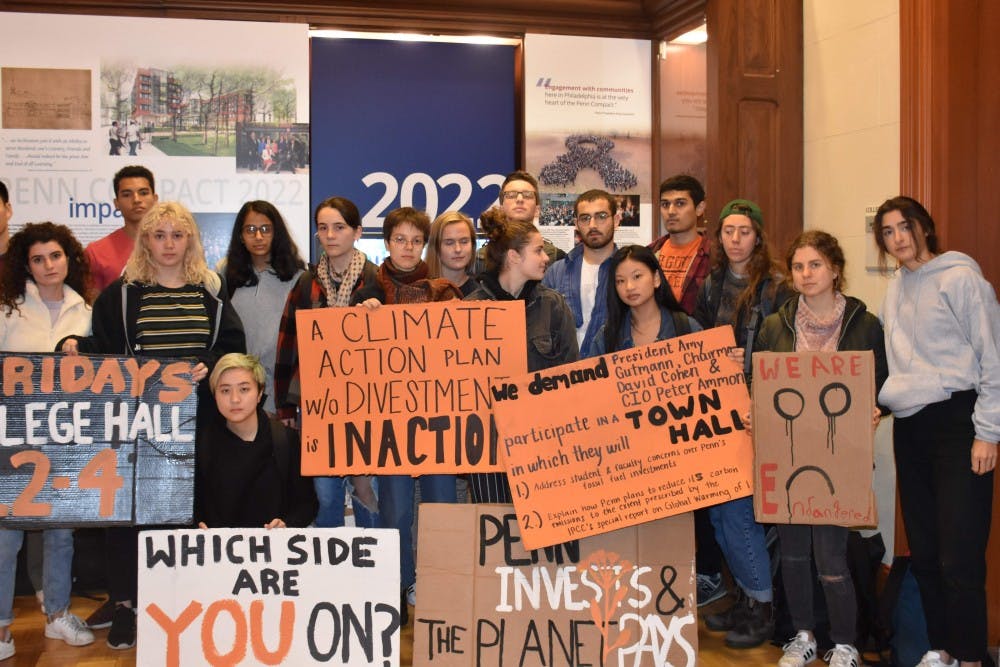The first floor of College Hall is filled with Penn students, sitting scattered across the lacquered wood. Some are chatting, while others work quietly on their laptops. A few of them hold bright orange signs with demands written in bold: "Stop funding climate change."
The chatter dies down and rises up again in waves. Occasionally, someone unfamiliar with the event wanders by, curious eyes attempting to decipher what exactly they’ve stumbled upon. One person sitting down in the room may be studying for physics while someone right next to them works on an internship application—others are simply talking about their days. Despite these differences, every person in the room has one thing in common: a demand for accountability from the Penn administration when it comes to climate change.

Penn’s administration has outwardly promoted progressive ideals. Like many college campuses, there have been pushes for diversity, sustainability, and equality. But for many students, these words are not enough—especially when it comes to one of the largest issues plaguing our world today.
In particular, Fossil Free Penn—a group that formed on Penn’s campus in 2014—is determined to make a difference in our administration’s handling of the climate crisis.
Fossil Free Penn has done a lot this year with their implementation of Fossil Free Fridays. Penn students gather every Friday from noon to 4 p.m. in College Hall to demand that the administration be held accountable for their continued investment in the fossil fuel industry.
The organization’s formation was inspired by the 2014 People’s Climate March in New York City. The march consisted of hundreds of thousands of people filling the streets to demand action against climate change. In fact, it went beyond just a march—it started a movement that rippled out to impact other countries and college campuses everywhere, influencing the creation of Fossil Free Penn.
The sit–ins are a powerful way of taking a stand—or rather, a seat—against the lack of action on the part of Penn's leaders. There’s a shared passion in the hearts of every student sitting in at College Hall each Friday.
Recently, the student–led group received attention for shutting down a Penn Board of Trustees meeting through peaceful protest. The protesters held signs demanding a town–hall meeting with administrators about future climate action, and chanted loudly in opposition to the current Penn Climate Action Plan—which still does not include divestment from fossil fuels. Days after the protest, multiple faculty members expressed public support for the movement in a guest column for The Daily Pennsylvanian.

While the protest was a loud and powerful gesture, the sit–ins seek to apply pressure through consistency. As explained by Campaign Coordinator Katie Collier (C '22), “With one–time actions, they have the opportunity … to not think about it again and ignore us." However, the repeated nature of the sit–ins is where the organization seeks to gain power, says Katie: "this never–ending, consistent, ‘We’re going to be here every Friday until you divest.’”
The goal is to keep coming back until the administration has no choice but to do something about it. More specifically, as Katie described, “We’re demanding that President Amy Gutmann, Chief Investment Officer Peter Aman, and Chairman of the Board of Trustees, David Cohen, all participate in a town hall in which they: one, address student and faculty concerns over … their multi-million dollar fossil fuel investments," and, "that they address how Penn plans to lower their carbon emissions in line with the IPCC special report on Global Warming of 1.5 degrees Celsius.”
A feeling of frustration seems to be another commonality between many of the protestors. Jacob Hershman (C '20), president of Fossil Free Penn, says, “The fact that Penn purports to have any commitment to sustainability or preserving the environment is completely undermined by the fact that it’s dumping money into the pockets of the people that are making this a problem in the first place.”
As is well–known by now, the IPCC report in October of 2018 declared that we have 12 years before we face the devastating consequences of climate change. Currently, the planet’s surface has warmed by 1 degree Celsius. According to the IPCC, if that temperature goes higher than 1.5 degrees Celsius, there will be serious repercussions in the form of droughts, sea level rises, and excessive heat waves.
“What’s it going to take?" said Jacob, "A bunch of students sitting in the middle of Penn’s main office.”

This isn’t just contained to Penn’s campus. Since Fossil Free Fridays began, other campuses have gotten involved in similar action to push their schools to divest. Fossil Free Pitt and Tufts have both considered or started similar sit–in protests.
Schools like Smith College and the University of California schools have already taken measures to divest. The aim of divestment is to seriously impact the fossil fuel industry—a leading cause of climate change.
It’s easy to stand aside and wait for the administration to make things right. It’s harder to decide to step in and make your own voice heard; however, it's important to pay attention to these protests. As the IPCC report says, we need unprecedented, radical change. Making a difference means making demands. And these demands aren’t just for those camping out in College Hall every Friday. They’re for everyone.

